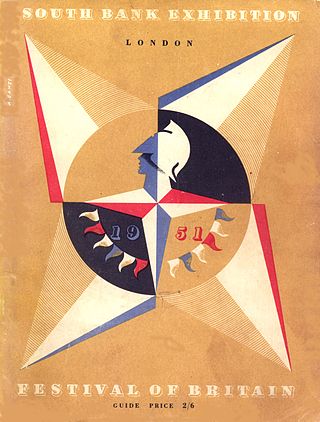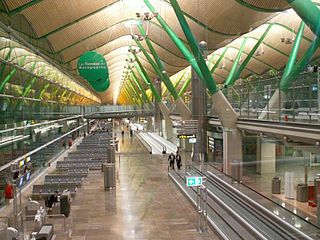
The Royal Horticultural Society (RHS), founded in 1804 as the Horticultural Society of London, is the UK's leading gardening charity.

The Festival of Britain was a national exhibition and fair that reached millions of visitors throughout the United Kingdom in the summer of 1951.

The University of Manchester is a public research university in Manchester, England. The main campus is south of Manchester City Centre on Oxford Road. The university owns and operates major cultural assets such as the Manchester Museum, The Whitworth art gallery, the John Rylands Library, the Tabley House Collection and the Jodrell Bank Observatory – a UNESCO World Heritage Site. The University of Manchester is considered a red brick university, a product of the civic university movement of the late 19th century. The current University of Manchester was formed in 2004 following the merger of the University of Manchester Institute of Science and Technology (UMIST) and the Victoria University of Manchester. This followed a century of the two institutions working closely with one another.

The Royal Institute of British Architects Stirling Prize is a British prize for excellence in architecture. It is named after the architect James Stirling, organised and awarded annually by the Royal Institute of British Architects (RIBA). The Stirling Prize is presented to "the architects of the building that has made the greatest contribution to the evolution of architecture in the past year". The architects must be RIBA members. Until 2014, the building could have been anywhere in the European Union, but since 2015 entries have had to be in the United Kingdom. In the past, the award included a £20,000 prize, but it currently carries no prize money.

Nottingham Trent University (NTU) is a public research university located in Nottingham, England. Its origins date back to 1843 with the establishment of the Nottingham Government School of Design, which still operates within the university.

Richard George Rogers, Baron Rogers of Riverside was a British-Italian architect noted for his modernist and constructivist designs in high-tech architecture. He was the founder at Rogers Stirk Harbour + Partners, previously known as the Richard Rogers Partnership, until June 2020. After Rogers' retirement and death, the firm rebranded to simply RSHP on 30 June 2022.

Imperial War Museum North is a museum in the Metropolitan Borough of Trafford in Greater Manchester, England. One of five branches of the Imperial War Museum, it explores the impact of modern conflicts on people and society. It is the first branch of the Imperial War Museum to be located in the north of England. The museum occupies a site overlooking the Manchester Ship Canal on Trafford Wharf Road, Trafford Park, an area which during World War II was a key industrial centre and consequently heavily bombed during the Manchester Blitz in 1940. The area is now home to the Lowry cultural centre and the MediaCityUK development, which stand opposite the museum at Salford Quays.

Jack Joseph Dongarra is an American computer scientist and mathematician. He is a University Distinguished Professor Emeritus of Computer Science in the Electrical Engineering and Computer Science Department at the University of Tennessee. He holds the position of a Distinguished Research Staff member in the Computer Science and Mathematics Division at Oak Ridge National Laboratory, Turing Fellowship in the School of Mathematics at the University of Manchester, and is an adjunct professor and teacher in the Computer Science Department at Rice University. He served as a faculty fellow at the Texas A&M University Institute for Advanced Study (2014–2018). Dongarra is the founding director of the Innovative Computing Laboratory at the University of Tennessee. He was the recipient of the Turing Award in 2021.

The Royal Institute of British Architects (RIBA) is a professional body for architects primarily in the United Kingdom, but also internationally, founded for the advancement of architecture under its royal charter granted in 1837, three supplemental charters and a new charter granted in 1971.

The Royal Scottish Academy (RSA) is the country’s national academy of art. It promotes contemporary Scottish art.

The Design Museum in Kensington, London, England, exhibits product, industrial, graphic, fashion, and architectural design. In 2018, the museum won the European Museum of the Year Award. The museum operates as a registered charity, and all funds generated by ticket sales aid the museum in curating new exhibitions.

Stephen Hodder is an English architect who won the RIBA's Stirling Prize in 1996. He is also a partner at his own practice Hodder Associates which was founded in 1992 in Manchester. In 2012, Hodder was elected for a two-year term as the president of the RIBA (2013–2015).

Sir David Frank Adjaye is a Ghanaian-British architect who has designed many notable buildings around the world, including the National Museum of African American History and Culture in Washington, D.C.. Adjaye was knighted in the 2017 New Year Honours for services to architecture. He received the 2021 Royal Gold Medal, making him the first African recipient and one of the youngest recipients. He was appointed to the Order of Merit in 2022.
Ian Ritchie is a British architect who founded Ian Ritchie Architects in 1981. His projects include the RIBA Award-winning Susie Sainsbury Theatre and Angela Burgess Recital Hall for the Royal Academy of Music, Sainsbury Wellcome Centre for Neural Circuits and Behaviour, University College London and the American Institute of Architects Award-winning Royal Shakespeare Company Courtyard Theatre. Ritchie was the first foreign architect to receive the French Academie d'Architecture Grand Silver Medal for Innovation.

Richard Lane was an English architect of the early and mid-19th century. Born in London and based in Manchester, he was known mainly for his restrained and austere Greek-inspired classicism. He also designed a few buildings – mainly churches – in the Gothic style. He planned and designed many of the houses in the exclusive Victoria Park estate.

SimpsonHaugh is an English architecture practice established in 1987 by Ian Simpson and Rachel Haugh. The practice has offices in London and Manchester. In 2014, the practice re-branded as SimpsonHaugh & Partners.

Manchester School of Art in Manchester, England, was established in 1838 as the Manchester School of Design. It is the second oldest art school in the United Kingdom after the Royal College of Art which was founded the year before. It is now part of Manchester Metropolitan University.

Feilden Clegg Bradley Studios is a British architectural design firm, established in 1978, with offices in Bath, London, Manchester and Belfast. The firm is known for its pioneering work in sustainable design and social design agenda.

The Sir Duncan Rice Library is the main academic library for the University of Aberdeen. It was designed by Schmidt Hammer Lassen Architects and completed in 2011. It is named after Duncan Rice, a previous Principal of the university. The cube-shaped building can be seen prominently from the entire campus and much of the city. It is a seven-storey tower, clad in zebra-like jagged stripes of white and clear glass. The building has a floorspace of 15,500 square metres. It houses several of the University's historic collections, including more than a quarter of a million ancient and priceless books and manuscripts that have been collected over five centuries since the University's foundation. There is also public exhibition space. The library replaced the smaller Queen Mother Library as the university's main library.
Edward Joseph McParland is an Irish architectural historian and author. He was elected as Pro-Chancellor of University of Dublin, Trinity College in 2013, and continues to give lectures after his retirement in 2008. McParland is the co-founder of the Irish Architectural Archive which was established in 1976, and he has contributed extensively to architectural conservation in Ireland.


















